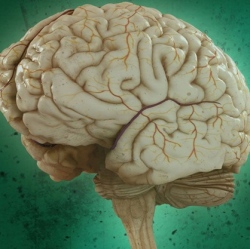
Small brain-computer interface (BCI) electrodes placed on or inside the brain allow patients to interact with computers or control robotic limbs simply by thinking about how to execute those actions.
This technology could improve communication and daily life for a person who is paralyzed or has lost the ability to speak from a stroke or neurodegenerative disease.
Now, University of Washington researchers have demonstrated that when humans use BCI technology, the brain behaves much like it does when completing simple motor skills such as kicking a ball, typing or waving a hand. So learning to control a robotic arm or a prosthetic limb could become second nature for people who are paralyzed.
“What we’re seeing is that practice makes perfect with these tasks,” said Rajesh Rao, a UW professor of computer science and engineering and a senior researcher involved in the study. “There’s a lot of engagement of the brain’s cognitive resources at the very beginning, but as you get better at the task, those resources aren’t needed anymore and the brain is freed up.”
